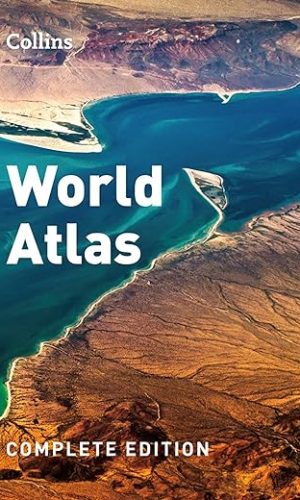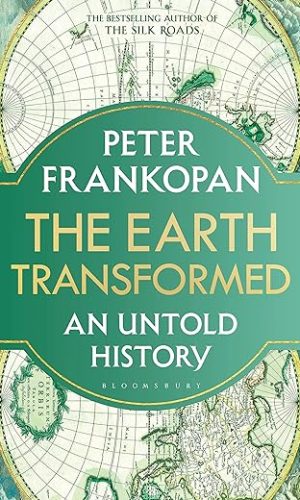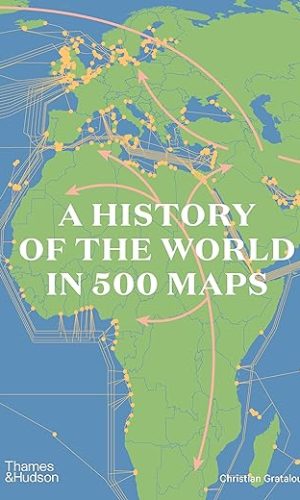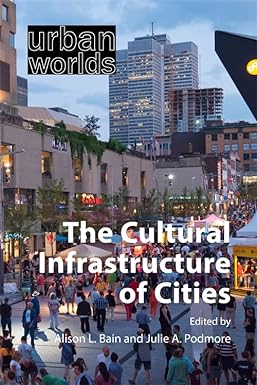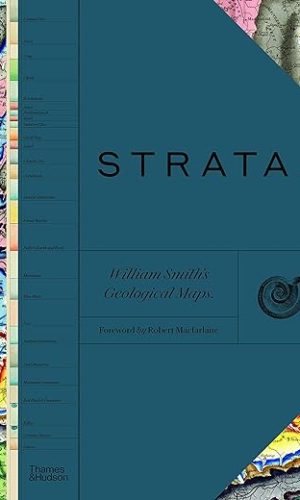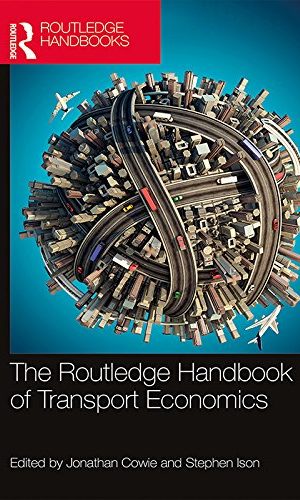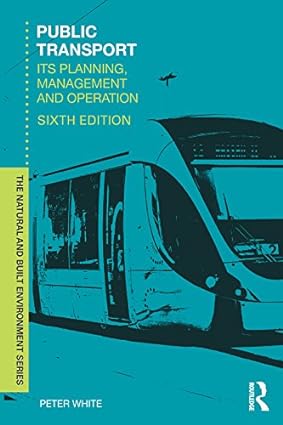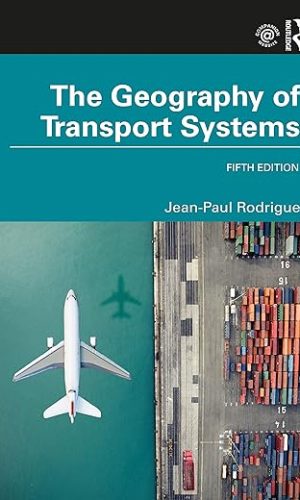Education
-
Collins World Atlas: Complete Edition
A beautiful gift for the adventurers in your family.
This atlas of the world presents a complete view of the world, bringing it to life through innovative maps, stunning images and detailed content. It offers an exciting perspective on how the planet is made up, how it looks and how it works.
This world atlas includes:
• Highly detailed, updated regional and world-wide mapping
• Wide range of topical issues covered including natural disasters, population, climate and the environment
• Key country statistics allow comparisons of their state of development and an understanding of today’s world
• Thousands of facts and statistics including world and continental ranking tablesMapping updates include;
• Country name changes – Czechia (formerly Czech Rep.), Eswatini (formerly Swaziland) and North Macedonia (formerly Macedonia)
• Place name changes in New Zealand and Australia
• Administrative structures in India, France, Ghana, Kazakhstan and Norway
• Changes to capital cities in Burundi and Kazakhstan
• Railways in France, motorways in UK, Russia and Ireland, new rail and road bridge across Kerch StraitRead more
£23.80£28.50Collins World Atlas: Complete Edition
£23.80£28.50 -
The Earth Transformed: An Untold History
A BBC RADIO 4 BOOK OF THE WEEK | AN INSTANT #2 SUNDAY TIMES BESTSELLER
‘Humanity has transformed the Earth: Frankopan transforms our understanding of history’ Financial Times
‘Vast, learned and timely work’ Sunday Times
——
From the international bestselling author of The Silk Roads comes a major history of how a changing climate has dramatically shaped the development-and demise-of civilisations across time.When we think about history, we rarely pay much attention to the most destructive floods, the worst winters, the most devastating droughts or the ways that ecosystems have changed over time.
In The Earth Transformed, Peter Frankopan, one of the world’s leading historians, shows that the natural environment is a crucial, if not the defining, factor in global history – and not just of humankind. Volcanic eruptions, solar activities, atmospheric, oceanic and other shifts, as well as anthropogenic behaviour, are fundamental parts of the past and the present. In this magnificent and groundbreaking book, we learn about the origins of our species: about the development of religion and language and their relationships with the environment; about how the desire to centralise agricultural surplus formed the origins of the bureaucratic state; about how growing demands for harvests resulted in the increased shipment of enslaved peoples; about how efforts to understand and manipulate the weather have a long and deep history. All provide lessons of profound importance as we face a precarious future of rapid global warming.
Taking us from the Big Bang to the present day and beyond, The Earth Transformed forces us to reckon with humankind’s continuing efforts to make sense of the natural world.
—–
‘This is epic, gripping, original history that leaps off the page’ Sathnam Sanghera, author of Empireland
‘All Historians aiming to tell a narrative face the problem of when exactly to start it. Only Peter Frankopan would go back 2.5 billion years to the Great Oxidation Event’ Tom HollandA 2023 HIGHLIGHT FOR: BBC NEWS * SUNDAY TIMES CULTURE * FINANCIAL TIMES * NEW EUROPEAN * GUARDIAN * NEW STATESMAN * THE TIMES * THE WEEK * WATERSTONES * BLACKWELL’S
Read more
£23.80£28.50The Earth Transformed: An Untold History
£23.80£28.50 -
A History of the World in 500 Maps
Trace the history of the world in over 500 easy-to-follow maps, from the dawn of humanity to the present day.Organized chronologically, A History of the World in 500 Maps tells a clear, linear story, bringing together themes as diverse as religion, capitalism, warfare, geopolitics, popular culture and climate change. Meticulously rendered maps chart the sequence of broad historical trends, from the dispersal of our species across the globe to the colonizing efforts of imperial European powers in the 18th century, as well as exploring moments of particular significance in rich detail.
• Visualizes 7 million years of human history.
• Analyses cities and kingdoms as well as countries and continents.
• Features major technical developments, from the invention of farming in the Fertile Crescent to the Industrial Revolution.
• Charts the spread of major global religions, including Christianity and Islam.
• Explores the increasing interconnectivity of our world through exploration and trade.
• Investigates warfare and battles from across the ages, from Alexander the Great’s conquests to the D-Day offensive.Read more
£24.50£33.30A History of the World in 500 Maps
£24.50£33.30 -
The Cultural Infrastructure of Cities (Urban Worlds)
Cities are synonymous with the production and consumption of culture. It is their material and human cultural infrastructure that also makes them archives and works of art. The Cultural Infrastructure of Cities critically re-examines the relationship between the urban and its cultures. It expands our understanding of the concept of urban cultural infrastructure and highlights the foundational role of culture to the materiality and sociality of urban life and the governance of cities.
The book begins with a theoretical overview of the cultural and infrastructural turns in urban studies scholarship. It then explores definitions of cultural infrastructure and its “hard” and “soft” dimensions before critically considering the vulnerabilities generated in the cultural sector by the Covid-19 pandemic. Chapters are organised in four thematic sections focusing on aspects of producing, performing, consuming and collecting culture, which feature detailed case studies from 17 cities across the global North and South.
This book will be of interest not only to students and scholars of urban studies, but also to policy-makers planning and creating cultural infrastructures as well as those working in cultural institutions and creative industries.
Read more
£26.20£28.50The Cultural Infrastructure of Cities (Urban Worlds)
£26.20£28.50 -
Other Asias
In this major intervention into the ‘Asian Century’, Gayatri Chakravorty Spivak challenges the reader to re-think Asia, in its political and cultural complexity, in the global South and in the metropole.- Major work from one of the world’s most distinguished literary and cultural theorists
- Intervenes in the fraught issues generated by ideas of Asia
- Featured essays include “Foucault and Najibullah,” “Moving Devi,” “Responsibility,” and “Megacity”
- Other chapters focus on, among other things, Human Rights, and the turbulent “present” of the Caucasus
- Essential reading for anyone interested in postcolonialism, and devotees of Spivak’s writing
Read more
£30.40Other Asias
£30.40 -
STRATA: William Smith’s Geological Maps
This sumptuous and comprehensive evaluation showcases Smith’s 1815 hand-coloured map, A Delineation of the Strata of England and Wales, with part of Scotland, and illustrates the story of his career, from apprentice to fossil collector and from his 1799 geological map of Bath and table of strata to his detailed stratigraphical county maps.The introduction places Smith’s work in the context of earlier, concurrent and subsequent ideas regarding the structure and natural processes of the earth. The book is then organized into four geographical sections, each beginning with four sheets from the 1815 strata map, accompanied by related geological cross sections and county maps (1819–24), and is followed by displays of Sowerby’s fossil illustrations (1816–19) organized by strata. Interleaved between the sections are essays by leading academics that explore the aims of Smith’s work, its application in the fields of mining, agriculture, cartography, fossil collecting and hydrology, and its influence on biostratigraphical theories and the science of geology. Concluding the volume are reflections on Smith’s later work as an itinerant geologist and surveyor, plagiarism by his rival – President of the Geological Society, George Bellas Greenough – receipt of the first Wollaston Medal in 1831 in recognition of his achievements, and the influence of his geological mapping and biostratigraphical theories on the sciences, culminating in the establishment of the modern geological timescale.
Read more
£34.10£47.50STRATA: William Smith’s Geological Maps
£34.10£47.50 -
The Routledge Handbook of Transport Economics (Routledge Handbooks)
The Routledge Handbook of Transport Economics offers the first state of the art overview of the discipline of transport economics as it stands today, reflective of key research and policy. Transport is an important area of study and one which is problem rich, stimulating a great deal of debate in areas which impact on everyday lives. Much of this focuses on the practicalities of the modern-day phenomenon of mass movement and all of the issues which surround it. The discipline of economics is central to this debate, and consequently the study and application of transport economics has a chief role to play in seeking to address subjects relating to major transport issues. It can be argued that at the very heart of any transport issue or problem lies the underlying economics of the situation – understand that and you alleviate the problem.
Featuring contributions from world-leading scholars and practitioners from across the globe, all of the chapters within this book are written from a practical perspective; theory is applied and developed using real-world examples. The book examines concepts, issues, ideas and practicalities of transport provision in five key topic areas:
- public transport
- public transport reform
- economic development and transport modelling
- transport and the environment
- freight transport.
A real strength of the book is in linking theory to practice, and hence the ‘economics’ that are examined in this text are not the economics of the abstract, but rather the economics of everyday living. Practical and insightful, this volume is an essential reference for any student or researcher working in all areas of transport provision, ranging from planning, appraisal, regulation and freight; and for all practitioners looking to develop their professional knowledge and who are seeking professional accreditation.
Read more
£36.80 -
Public Transport: Its Planning, Management and Operation (Natural and Built Environment Series)
Public Transport provides an accessible introductory text to the field of public transport systems, covering bus, coach, rail, metro, domestic air and taxi modes. The market structure is set out, together with data collection methods. The technology of bus and rail systems is introduced with particular reference to peak capacity and energy consumption. An analysis of cost structures and costing methods leads into a review of pricing concepts and their application. In addition to issues related to urban systems, specific chapters cover rural public transport and the long-distance sector. A concluding chapter examines long-run policy issues, such as likely population changes and scope for substitution of travel. The primary context taken is that of the British Isles, drawing extensively on data such as the National Travel Survey in England. However, the principles and findings are also broadly applicable to countries of similar per capita income and population density.
This sixth edition introduces a new chapter on data collection and survey methods for public transport systems in addition to a general update of the text to reflect the latest statistical evidence, research findings and policy changes. Public Transport is an essential textbook for both students in transport and those in related fields. This is an invaluable resource for transport planners in local authorities and consultancies.
Read more
£44.50 -
The Geography of Transport Systems
This expanded and revised fifth edition of The Geography of Transport Systems provides a comprehensive and accessible introduction to the field with a broad overview of its concepts, methods and areas of application. Aimed mainly at an undergraduate audience, it provides an overview of the spatial aspects of transportation and focuses on how the mobility of passengers and freight is linked with geography.
The book is divided into ten chapters, each covering a specific conceptual dimension, including networks, modes, terminals, freight transportation, urban transportation and environmental impacts, and updated with the latest information available. The fifth edition offer new and updated material on information technologies and mobility, e-commerce, transport and the economy, mobility and society, supply chains, security, pandemics, energy and the environment and climate change. With over 140 updated figures and maps, The Geography of Transport Systems presents transportation systems at different scales ranging from global to local.
This volume is an essential resource for undergraduates studying transport geography, as well as those interested in economic and urban geography, transport planning and engineering. A companion web site, which contains additional material such as photographs, maps, figures and PowerPoint presentations, has been developed for the book and can be found here: https://transportgeography.org/
Read more
£50.30

